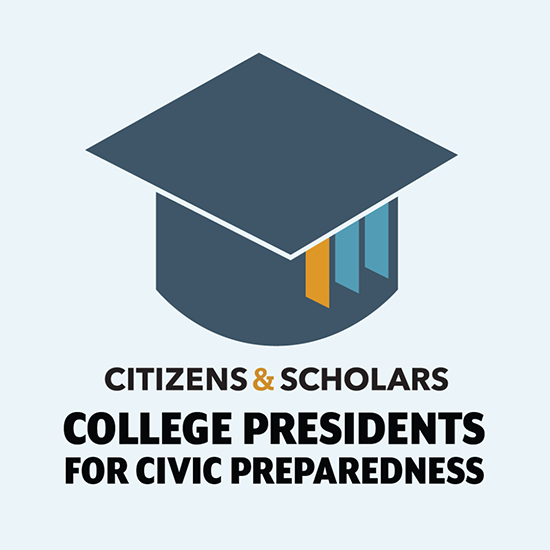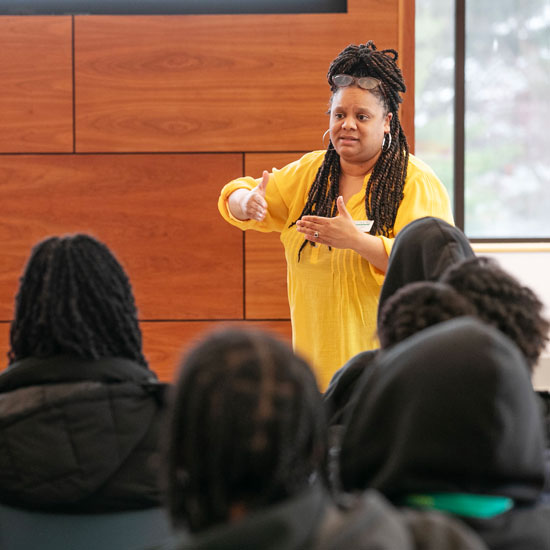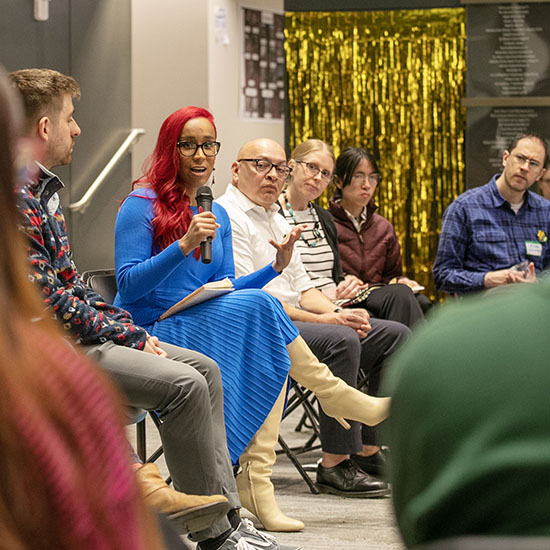Here comes rhymin' Simon
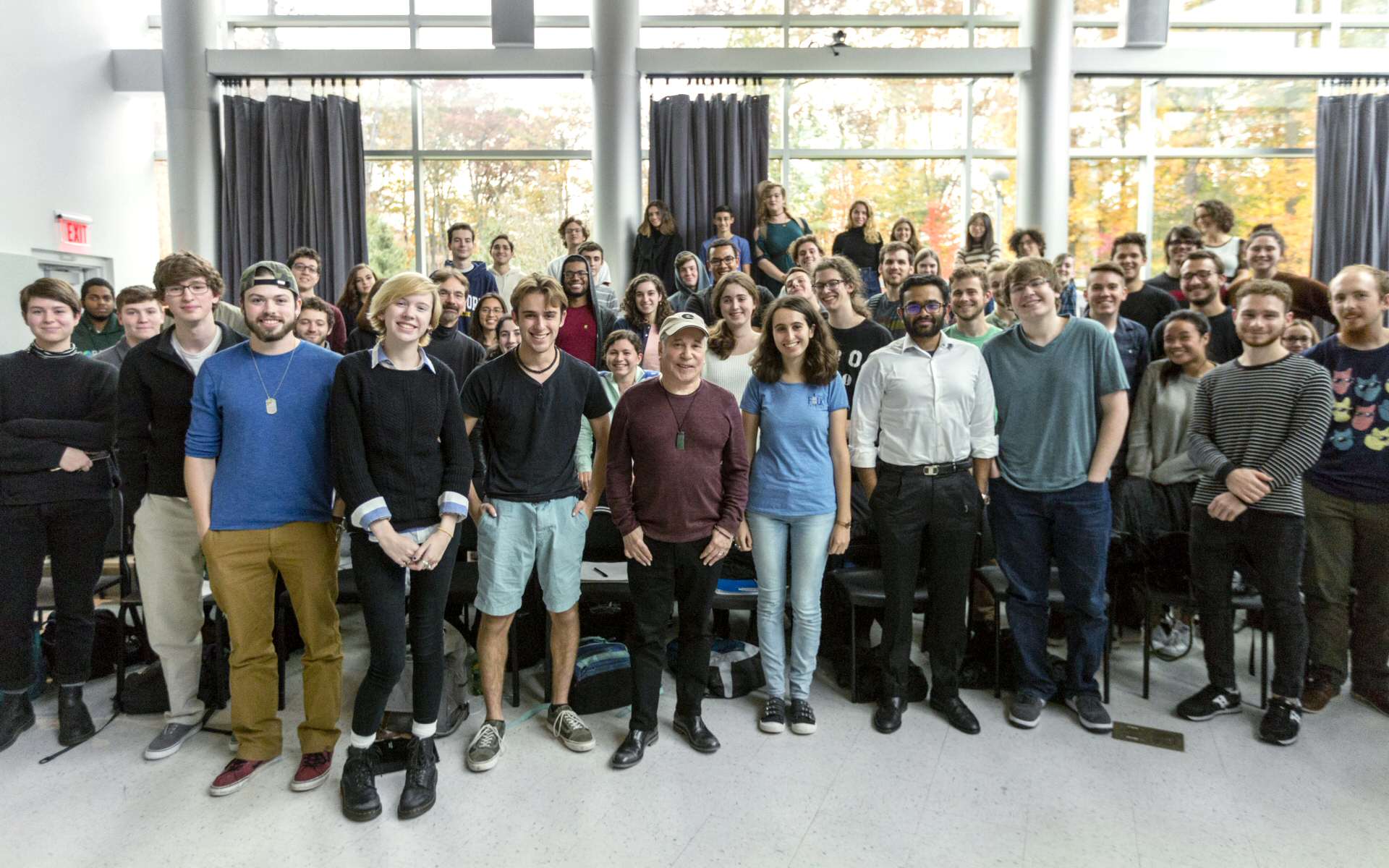
Clichés have their value, according to that genius of unique songwriting, Paul Simon. "After a phrase that conveys a complex image or uses unusual words, I often make the next phrase very familiar—even a cliché. It takes listeners time to absorb a dense phrase, so following it with something simple, or just 'lie-la-lie,' lets the impact of the phrase get through." Also, strategic placement can add value: "A cliché when it's not expected can break your heart."
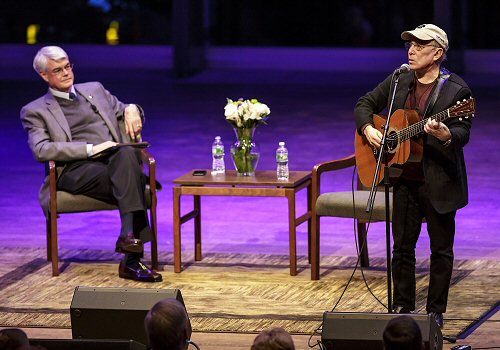
Paul Simon offers an impromptu performance during his interview with Phil Glotzbach.
(Photo by Chris Massa)
Simon, the 16-time Grammy winner who helped create the soundtrack of American life for the past six decades, was sharing
insights in a songwriting masterclass for a group of music and English students, with
whom he set a vibe that was relaxed yet intensive, open yet intimate. When a student
began her question with "So, I was wondering..." he interjected, "See? You might be
able to use that phrase—it's obviously natural for you," and then said, "Sorry, what
was your question?"
When a white male asked how a white male can incorporate other cultures' material
without "appropriating" it (a charge leveled at Simon's Graceland project with South African musicians), the answer was: "You can't help but be influenced
by what you love. Unless you do a bad imitation, which could be seen as offensive
for denigrating the original, don't worry about it. Use what seems valid for you and
take the criticism. All that's required is to respect what people say and do your
own art." What's important, he added, is to "investigate deeply. It's invigorating
to discover something new to incorporate into your thinking. As you know, everything
is connected to everything, in music and in life."
After the class, Simon took the Zankel stage, with Skidmore President Philip Glotzbach
as interviewer, for "A Conversation about a Musical Life." (A few days before this
event, students, faculty and staff had reserved every seat in the concert hall in
less than two hours.) Both events were free of charge, and on stage Simon surprised
the crowd of nearly 600 with acoustic performances of "Questions for the Angels" and "American Tune."
“A beautiful, compelling melody
can move you to tears, and you
don't know why.”
World harmonics
Also a philanthropist, Paul Simon co-founded the Children's Health Fund, providing mobile medical care to low-income children and their families around the
United States, and has raised funds for other causes from Autism Speaks to Tibet House.
His net proceeds from this past June's U.S. tour went to the Half-Earth Project to stop the species extinction crisis by conserving half the planet's lands and oceans.
He told the Skidmore crowd, "We are in a battle for survival. With the ecosystem collapsing
and with climate change, we could very well be facing a planetary extinction on the
level of what happened to the dinosaurs." Noting scientists' remarks that Earth has
the potential to become a paradise or a wasteland, he said, "I won't see the answer
to that question. I just had my 76th birthday. But it affects my children and grandchildren."
His call to action: "Everybody has to join the fight. I perform and give the money—that's
what I can do. You all have to find what you can do."
He also told the audience of his earliest influences, such as Elvis Presley, Johnny
Cash, Chuck Berry and, perhaps most strongly, the Everly Brothers. He recalled taking
those inspirations along when he and Art Garfunkel—neither yet 16 years old—traveled
from Queens to appear on American Bandstand. And he told of other gigs with college chum Carole King, of the 1950s when "audiences
that were used to hearing 'How Much is that Doggie in the Window'" got to hear the
likes of Ray Charles on mainstream radio, and of his time in England learning folk
guitar (he admired Joan Baez and Bob Dylan) and hearing ska from Jamaican artists
before reggae became popular.
For the students, Simon played a CD of a work in progress: a new version of his 2000
original "Darling Lorraine." Calling it "a song's song—all about the story"—he said he didn't know where it
was going while he was first writing it, but when he came up with the line "I'm sick
to death of you," he recalled, "I suddenly realized, uh-oh, she's going to die! Now
I had my story, and the rest was just editing."
He reminded students that "lyrics, no matter how enriched the language or imagery,
are not the same as poetry, because the words work with music." And how does he start
devising new music? He grabbed his guitar to demonstrate, singing a continuous note
while strumming a few chords that all carried that note. By trying different chord
progressions, and then noodling the same way with a different sung note, he could
find the basics of a melody.
"Once in a while, I'm just the channel and the song flows. It's great when that happens."
In "being connected to the universe and having things flow out almost effortlessly,"
he has learned, serotonin and dopamine produces a feeling of well-being, "and suddenly
you say, 'Gee, I can't believe it's 2 a.m.' You're surprised by it; you're the audience
for your own brain." This interest in neuroscience also flavors his joy in hearing
"young players who are virtuosos. A beautiful, compelling melody can move you to tears
and you don't know why. It's fascinating."
Simon had a tip about melody for the students too. When he listens to his playbacks
during editing, he said, "Ear goes to irritant—all that stands out are the moments
that make me wince." The first remedy is "to simply remove the irritant. Maybe you
can replace it with something better, or maybe removing it is the solution." Another
important tip: "If you keep editing and nothing is working, don't keep trying, because
it's the premise that's the problem."
With his children also musicians, perhaps it's no wonder that Simon was so authentic
and practical in engaging the young Skidmore musicians and writers. After 90 minutes,
and despite his tight itinerary, he lingered in the classroom with a ring of rapt
students around him and talked more—for instance, about consistency vs diversity in
a body of work, he said, "You can't only keep mining something; you gotta feed it
too." Finally trailing out of the empty room, a student told her companion, "That
was the most exciting thing ever!"
He told the Skidmore crowd, "We are in a battle for survival. With the ecosystem collapsing
and with climate change, we could very well be facing a planetary extinction on the
level of what happened to the dinosaurs." Noting scientists' remarks that Earth has
the potential to become a paradise or a wasteland, he said, "I won't see the answer
to that question. I just had my 76th birthday. But it affects my children and grandchildren."
His call to action: "Everybody has to join the fight. I perform and give the money—that's
what I can do. You all have to find what you can do."
